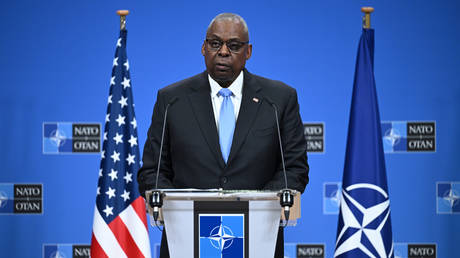Pentagon Says Kiev Can Strike Russia Without US Missiles
US Defense Secretary Lloyd Austin stated, "Kiev doesn’t need anyone’s permission to use its long-range UAVs against Russia." Read the full article at RT.com.

According to US Defense Secretary Lloyd Austin, Ukraine’s long-range drones are highly effective, cost-efficient compared to Western missiles, and do not require permission from other nations for deployment.
Ukraine has persistently requested Western long-range weapons and the approval to use them for strikes deep within Russian territory. In response, Russian President Vladimir Putin has cautioned that such actions would lead to open conflict with the West and has indicated a potential reevaluation of Moscow’s nuclear strategy.
After the NATO defense ministers’ meeting in Brussels on Friday, Austin sidestepped questions regarding Western long-range missiles, which seemed to imply that Putin's "nuclear blackmail" was having an effect.
He also refuted the suggestion that the US had advised Ukraine to cease drone strikes deep into Russia.
“We’ve seen Ukrainians use their long-range UAV strike capability to great effect,” Austin stated. “They’re able to produce these UAVs in Ukraine. They’re able to scale that production rapidly. The UAVs have proven to be very effective and accurate.”
“When you consider the fact that one precision guided missile costs, in some cases, close to $1 million – depending on what it is – and these UAVs they can produce in great numbers at a fraction of the cost,” he added. “So you look at the balance sheet, and the effects that are being created on the battlefield, I think this is a great capability.”
“How they use the capability that they’re producing is going to be their call,” the Pentagon head emphasized.
Earlier this year, Ukraine carried out a series of drone strikes on Russian infrastructure, targeting oil depots and refineries. Reports indicated that the US government urged Kiev to halt these strikes, fearing they could significantly impact oil prices during an election year.
Austin had previously expressed concern to the Senate in April about the “knock-on effect in terms of the global energy situation” stemming from Ukrainian drone attacks on Russian refineries. Meanwhile, his deputy Celeste Wallander informed lawmakers that the strikes “have not significantly altered Russia’s ability to prosecute the war.”
In reaction to Ukraine's drone offensives, Russia responded with missile strikes that severely damaged Ukraine's energy infrastructure, leading to a noticeable decline in the frequency of Ukraine's long-range attacks.
Allen M Lee for TROIB News
Find more stories on Business, Economy and Finance in TROIB business












